#the evangelion annotation project
Text

In yet another blow against the Netflix translation of this scene, we also have officially-published Evangelion material using 好意 as a term for (romantic) affection.
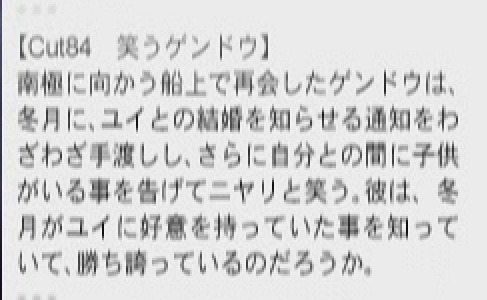
Here, the menu commentary (Renewal of Evangelion, Disc 6) for Episode 21 refers to Fuyutsuki's (inarguably romantic) feelings for Yui with the term 好意. This ought to dispel the notion that that word is best translated as "favour" or "grace" in Episode 24, when considered alongside the fact that Kaworu clarifies his intended meaning by saying
「好きってことさ」
57 notes
·
View notes
Note
Do you have any preference on the ADV Dub x Netflix Dub x Japanese with subs?
I watched the original ADV subs but I keep seeing this ongoing debate about the accuracy and nuance of the voice acting in both dubs, and I wonder if I lost something of the story along the way that's been lost in translation? Everybody seems to agree that the subs are better, though
I actually don't watch anime dubbed. I have been watching Chinese cinema since I was small so subtitles made sense to me.
My husband watched the ADV dub and after watching NGE subbed he commented that they took some liberties with the interpretations on scenes, adding comic relief where there was previously no dialogue.
I have watched clip comparisons of both dubs, but my biggest problem with localization is that dubs tend to focus on "being hip with the kids" and adding slang or comedy in strange spots in the show OR they take everything so literally that the translation is clunky and you end up with dialogue that no native English speaker would ever say.
I have HUGE respect for voice actors and translators, they do work that is demanding and the industry has improved in some ways, but in others, they are still very much exploited and overworked.
You can see some interesting script notes and such over at @jinruihokankeikaku with the Evangelion Annotation project! The storyboards and groundwork art also provide insight into plot and story, sometimes with notes on the tone of the story or things to include.
3 notes
·
View notes
Text
Referencesreferencesreferences
Lauren Oyler is my favourite living critic, and I’m excited to read her debut novel Fake Accounts. I’ve been reading a lot of the press around it, including this interview with The Atlantic where she answers the question “ To what extent do conspiracy theories and fiction relate to each other?” thusly
To great extent! You could say conspiracy theories are like bad fiction, which attempts to tie everything up and explain it all. Neither leave room for randomness or pointlessness or meaninglessness. But life is full of all these, and our desire to eliminate them leads us down narrower and narrower paths.
There’s also a tendency to read symbols and metaphors in life the way we read them in fiction, which creates all sorts of problems. When you read symbols and metaphors in fiction, you know where they came from: the author. If you find a symbol or metaphor in life, you might start freaking out about where it came from and what it really means. The specifics of the stories conspiracists tell tend to camouflage the more interesting elements about them, which to me are all about (1) motivation—why am [I] being told this?—and (2) their unstable relationship to the real: Some aspect of this could actually be true, or come from something real. Both are essential elements of fiction as well.
Which, first of all, is a characteristically incisive read on the proliferation of conspiracy theories within modern western political discourse. It also resurfaced in my mind today, a couple of weeks after I first read it, whilst scrolling through the Genius entries for songs from Black Country, New Road’s hot-off-the-press debut album, For the first time.
youtube
I really really like For the first time. Opening your debut album with an instrumental called “Instrumental” and ending with a song called “Opus” are a sandwich of baller moves. “Track X” is what a love song written by Steve Reich might sound like. I’m not the only one to notice that considerable changes had been made to the lyrics and arrangements of pre-album singles “Athen’s, France” and “Sunglasses,” the latter of which was one of my most-listened songs in 2019 and 2020, if Spotify’s records are to be believed. Not being smart enough to figure out the changes for myself, and heeding Jarvis’s First Law, I went over to the often-ironically-named Genius with the expectation that the site’s membership may well have crowd-sourced annotations which would do the heavy analytical lifting for me.
[Adam Curtis voice] And then, something strange happened. Well, maybe not strange, but sort of interesting. The problem with Genius has been well documented by more intelligent documenters than I, as are the potential pitfalls of crowdsourcing knowledge in general. In this particular instance, the phenomena I happened upon wasn’t the proliferation of white boys clumsily trying to pick apart the internal rhymes and culturally-specific reference points of trap songs, but a form of context collapse typical of a lot of so-called cultural critiques you get on the Internet of 2021.
Talking to everyone and talking to no-one has lead to a curious reading of Black Country, New Road’s lyrics (part of a verbose, hyper-referential scene that primarily exists in my head, alongside Squid). Rather than drawing on the specific socioeconomic and cultural context the band exist in, and which they often directly call out in their music, there’s a grasping to read symbols and metaphors in an almost wilfully literal and dull fashion. And imho it sucks!

Above is a representative example from the Genius page for the single version of “Sunglasses.” It’s a song which wields the cultural signifiers of comfortable middle class existence in modern Britain with equal parts disgust and familiarity. Amongst The Guardian-friendly reference points are Nutribullets, single malt whiskey, complaining about mediocre theatre and, in the killer of an opening line, multi-part Danish crime dramas of the sort that air on BBC Four. All of these work in concert to produce, in the words of frontman Isaac Wood, a portrait of a family of “wealth or affluence.” Crucially, however, not one “written from a critical or even external position,” which is one of the more interesting aspects of the song (and the band in general), occupying as they do a self-reflexively privileged position not dissimilar to the Metropolitan Liberal Elite’s satirical voice of choice, Stewart Lee. It makes things slipperier, harder to gain purchase on. The mix of the specific and abstract in the song is intentional: you’re never going to uncover a “true meaning,” but you can at least get a sense of what they’re trying to communicate.
What the ironically-named Genius annotators choose to focus on, however, is not this fairly obvious deployment of cultural symbols amidst an otherwise allusive and elusive set of lyrics, but unpicking precisely which six-part Danish crime drama is being referenced. I will charitably admit that yes, perhaps there is a specific show Wood is referencing in his lyrics here, but: who gives a shit? That’s besides the point! “Knowing” that he’s singing about something called The Jack of Hearts doesn’t add anything to the song (it also belies a further cultural ignorance in that the phrase is clearly used here, paired with The Fonz, as a somewhat-ironic iconic “Cool Guy”). Susie Sonts would be spinning in her grave if she got anywhere near this shit.
youtube
In “Against Interpretation”, one of the foundational texts which informed my way of thinking about art and criticism and I would argue is crucial in navigating the anaemic and non-confrontational symbol-chasers of today, Susan Sontag rails against the “contemporary zeal for the project of interpretation [...] often prompted by an open aggressiveness [...] The old style of interpretation was insistent, but respectful; it erected another meaning on top of the literal one. The modern style of interpretation excavates, and as it excavates, destroys.”
This is the dominant interpretative style of now. From politics to indie rock, there is a harried, prescriptive and literal approach to making sense of things, of settling on rote and superficial readings. A symbol has a literal meaning; A means A; references are not poetic allusions, but puzzle boxes to be cracked open and, once they have, mastered and then returned, inert and unusable, to the shelf. There are fewer attempts to approach texts in good faith, or to acknowledge the broader context in which people act and create, a bastardised deployment of Barthes which makes the word significantly less interesting, as opposed to the other way around. Do you think the couplet “Trips to B&Q with your other half / This is how the other half lives” in Squid’s “Houseplants” is part of a similarly vicious-yet-complicit takedown of middle class life, or calling out Jacob Riis’s 1890 work of photojournalism “documenting squalid living conditions in New York City slums”?
There is a disengagement with context and, in its place, an analytical approach which -- in this instance -- appears to me to also shirk engagement with the “randomness or pointlessness or meaninglessness” of some of the cascading cavalcade of references, veiled and otherwise, culturally and personally specific, which is one of the most entertaining aspects of Black Country, New Road’s music. Instead it’s about finding a definitive meaning, often through the filter of other reference points which are not actually appropriate or relevant, as a sort of attempt to assert dominance over a text. As the conspiracy theorist incorrectly applies close reading to chaotic reality in order to create a kind of order, so the Genius annotator manages to lack the ability to apply close reading to a chaotic text. To further co-opt Oyler’s words, the paths ought to be sprawling off in all directions, rather than narrow and meticulously signposted.
Anyway. Back soon to actually talk about the changes made between the single and album versions of “Sunglasses” and “Athen’s, France,” with reference to Evangelion and Car Seat Headrest’s Twin Fantasy (Mirror to Mirror)/ (Face to Face)!
#black country new road#lauren oyler#susan sontag#criticism#context collapse#music journalism#genius
0 notes
Text

"This is the bittersweetness of adolescence."
(From EVA tomo no kai. If you ask me, this phrase comes pretty close to summarising 'Evangelion in a word'. Or at least, one of its major themes.)
36 notes
·
View notes
Text

The End of Evangelion 26' (まごころを、君に) Cuts 176-178
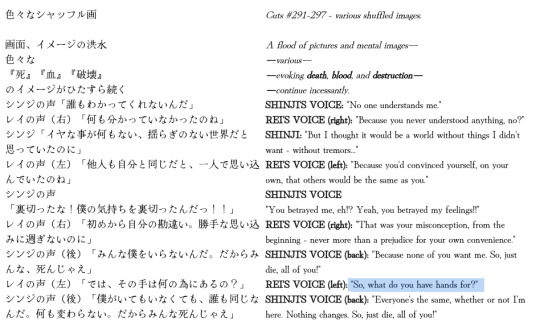
The End of Evangelion 26' (まごころを、君に) Cuts 291-298
The two contenders for my favorite single line in my favorite film. I showed these to my dad and he said, "What do we have hands for? Well, playing the cello, of course."
Truer words.
31 notes
·
View notes
Text
It's striking to me that (in the afureko script, at least) Shinji's reactions to and feelings for Kaworu aren't described in terms of brotherly love/platonic friendship, or romantic/erotic love, or paternal/masculine transference (i.e., the Kaworu-as-male-role-model / Kaji-analogue interpretation), so much as they're described in terms of refreshment, relief, and clarity.
The script gives the impression that the specific character of the love between them is (at least from Shinji's standpoint) not so important as the relief that Kaworu's arrival provides - he's delivering unto Shinji something that his other love-interests (Misato, Rei, Asuka) and significant male figures (Gendo, Kaji) did not or could not provide - that is to say, unconditional acceptance. "You are worthy of affection," Kaworu says - and as the script explicitly points out, Shinji's not used to hearing those words, not in the least. The only comparably phrased script note, interestingly enough, comes much earlier - when Misato welcomes him into her home in Episode 2.
Of course, this is not to discount the homoeroticism in their scenes together (which is decidedly present & intentional, as evidenced by earlier script drafts of Episode 24' as well as Kaworu's explicitly romantic language towards Shinji). Nor is it to dismiss the idea that Kaworu represents some kind of idealized platonic (male) companionship (which is also not without a kernel of truth). It's just interesting to me that what the script emphasizes is not the nature of their relationship - star-crossed and inchoate as it is - but rather Shinji's experience of their encounter, their meeting (that is, the very meeting Kaworu said he might've been born for). We're given details on Shinji's visceral reaction (he feels refreshed as if by a breeze, he feels clarity, he blushes, he's awestruck, his heart pounds), but only two words and one line of internal monologue on his emotional or intellectual response to Kaworu, which largely suggests confusion and inarticulate (inarticulable) admiration.
The impression that I get from all of this is that Shinji doesn't have time to fully process his feelings before forces beyond their control tear them apart; he's left with only the memory of Kaworu's brief & total kindness, and his wish that it had not ended the way it had.
75 notes
·
View notes
Text

"All of the wires and plumbing converge upon a human-sized test tube here.
At the top of it, the wiring takes on a form akin to that of a giant cerebrum.
Before it stands Ikari.
The test tube has been filled full of LCL solution.
Immersed therein, naked as the day she was born, is Rei.
Having noticed Ikari, perhaps, Rei softly opens her eyes.
Her expression - like the archaic smile.
The two of them are gazing at each other, wordlessly.
In the Eva Original script for Episode 15, Rei's expression in the LCL tube in Central Dogma is compared to the "archaic smile", a expression used in Archaic Greek sculptures - according to Wikipedia, most frequently in the 6th century BCE.


This comparison is absent in the episode's afureko script, and the expression Rei shows in the cut as animated is rather more subtle than many of the examples of the archaic smile that I could find. Nonethless, it's an interesting and striking reference, and one which I'd not come upon in Eva-related documents before.

The corresponding footnote in Eva Original makes this clear, though, explicitly confirming the reference to historical sculpture -
"Incidentally, 'archaic smile' refers to an expression with the lips tilted upward slightly at both ends to form a smile, seen in the sculpture of Ancient Greece."
#nge#the evangelion annotation project#eva original#if anyone knows more about this i'd be curious to hear!
36 notes
·
View notes
Text

The last scene of Episode 11 - the scene in which Shinji, Asuka, and Rei look down upon Tokyo-3 from atop a small hill. During the screenwriting stage, it seems there was a proposal that Aoba would be singing while playing his guitar beside them - oh, just like at a campfire! If the scene had played out like that, then the fact that he'd been carrying a guitar in the scene at the coin laundry would have foreshadowed it.
(From EVA Fan Club #6.)
23 notes
·
View notes
Text

The Eva Original version of the first Human Instrumentality Committee scene in Episode 2 is interesting for a number of reasons. The fact that the Committee was, at this stage of production, conceived of as a group of both men and women is somewhat curious, when the anime ultimately depicts all of its members as men, as is the fact that Keele Lorenz had already been given his name, which the audience doesn't learn until Episode 21. The setting of the Committee's meetings is, if I recall correctly, never explicitly stated in the anime, but the Original script gives it as "UN Headquarters in Tokyo-2/Matsuyo", which we know from The End of Evangelion is the current site of the Japanese capital and prime minister's office in the setting of Eva. The reference to "Gestaltzerfall" is also rather esoteric, and was, understandably, cut from the final version of the episode. I'll admit I had to look that one up, and I still can't say I fully understand it. Lots to puzzle over for such a brief scene!
15 notes
·
View notes
Text
In celebration of the 28th anniversary of Neon Genesis Evangelion's first episode, here's my translation of both pre- and post-storyboard versions of the Episode's script, complete with cut-by-cut notes from Ogawa B. and Oguro Yuuichirou's columns in Eva Fan Club, as well as translations of the footnotes from Eva Original - a total of 90 annotations, some never-before translated, linked in-line as endnotes in the PDF.
#the evangelion annotation project#eva original#neon genesis evangelion#eva fan club#the timing worked out perfectly! how 'bout that!
17 notes
·
View notes
Text
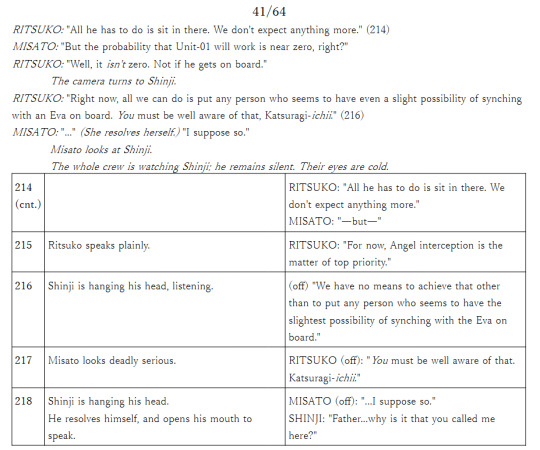

Side-by-side comparison of pages 41-42 (cuts 214-223) of the script for Episode 1, in Eva Original and in the final afureko script. Posting because it's a good example of the kind of subtle differences between the two script versions - a few small shifts in phrasing, and one or two added lines, really reflect the kind of shifts that go on during the process of storyboarding.
Here, the two most notable differences in dialogue are that an exchange between Ritsuko and Misato was cut, and replaced with Ritsuko cutting Misato off before she can voice her objection and delivering a more detailed reason for putting Shinji on board; and, that an exchange between Shinji and Gendo was added, making the tone of their conflict more emotional as Shinji accuses his father of never having needed him. (Shinji also asks his father out loud if he's being ordered to get in the Eva and fight, and gets an affirmative reply, whereas in the final version of the Episode, he just asks why he was called, to which Gendo confirms his implicit suspicion.)
There's also a slight difference in the sequence of shots, with the Original script emphasing the Nerv personnel watching Shinji, which we don't really see until a little bit later in the final version of the episode.
12 notes
·
View notes
Text

Misato and Kaji's return to the apartment after Shinji and Asuka's ill-fated attempt at kissing was somewhat different in the Eva Original version of the script. Shinji remarks that Misato is always like this, and Misato rages at him for saying that sort of thing in front of "this guy" [Kaji], slurring her speech. Kaji, upon seeing that she doesn't put her futon away during the day, remarks that she hasn't changed in that regard; Misato's not too pleased with this comment, either. She kicks about at things before going to bed, and we get a shot of Shinji watching her from outside her room before he closes the fusuma.
23 notes
·
View notes
Text
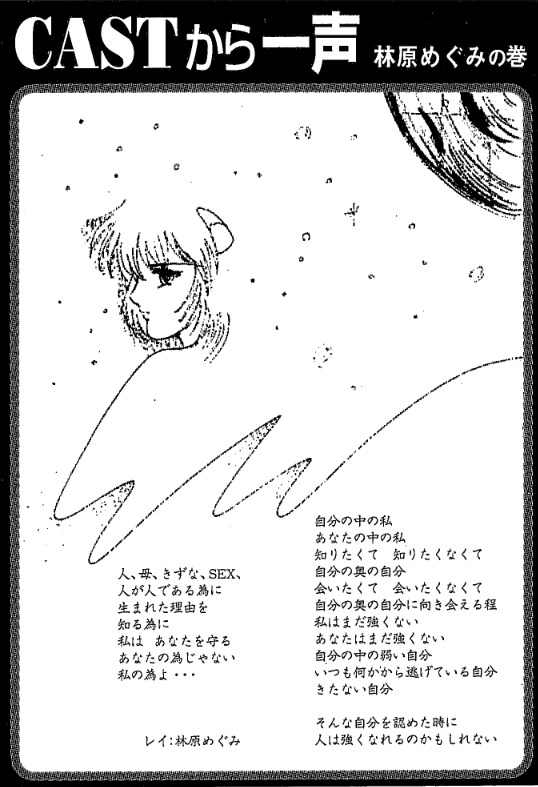
CASTから一声 林原めぐみの巻
A Word from the Cast - Hayashibara Megumi
自分の中の私
あなたの中の私
知りたくて 知りたくなくて
自分の奥の自分
会いたくて 会いたくなくて
自分の奥の自分に向き会える程
私はまだ強くない
あなたはまだ強くない
自分の中の弱い自分
いつも何かから逃げている自分
きたない自分
そんな自分を認めた時に
人は強くなれるのかもしれない
人、母、きずな、SEX、
人が人である為に
生れた理由を
知る為に
私は あなたを守る
あなたの為じゃない
私の為よ…
レイ:林原めぐみ
The 'me' within myself
The me within you
I want to know her...and I don't
The self beyond myself
I want to meet her...and I don't
To face the self beyond myself...
I'm not strong enough.
You're not strong enough.
The self within myself that's weak
The self that's always running away from something
The baser self
When people acknowledge themselves as such
Then, they may be able to grow strong.
People, mothers, bonds, and sex
So people may be people
So that we may know
The reason we were born
I will protect you.
Not for your sake -
- but for my own...
Rei / Hayashibara Megumi
28 notes
·
View notes
Text
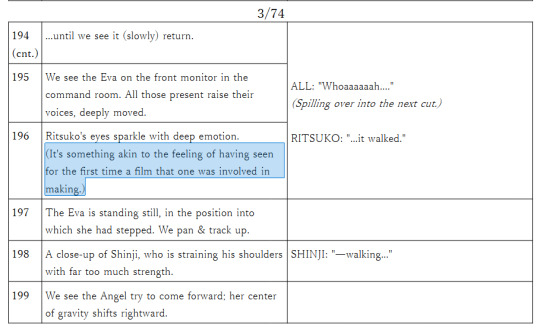
One of my favorite lines from any Evangelion script. Here, one of the writers (Enokido or perhaps Anno) explicitly describes the feeling they're trying to evoke - a feeling clearly drawn from personal experience.
12 notes
·
View notes
Text

Renewal DVD menu commentary on Neon Genesis Evangelion, Episode 4, Cut #86.
The lake visible past Shinji as he walks is Lake Ashi. Ordinarily, when children run away from home, they wander around aimlessly within the reach of their parents' bringing them home - and likewise, Shinji, having run away from home, never strays far from Misato's side, either.
18 notes
·
View notes
Text
Update on the Evangelion Annotation Project
So, I just got home from a lovely walk, and I thought I might post an update on what I've been working on in terms of translations.
My translations of Evangelion Original Ⅰ~Ⅲ remain in progress - I completed the transcription process back in the spring - but lately I've been working on transcribing and translating various essays, manga, and bits of commentary published in the Eva Fan Club newsletters included with Evangelion's Renewal DVD release. I've already posted to Neocities a transcript and translation of a letter written by animator & assistant director Masayuki that was published in Issue 10 of Fan Club, and I'm currently working on translating the seven short essays written by Oguro Yūichirō (co-creator of Revolutionary Girl Utena, and author of the newsletter's "More Minutiae" column) that were published in various issues of the same publication. In order, these essays address -
Kensuke, his personality, and his interactions with Shinji in Episodes 3 & 4 - The Boy Called Kensuke
The interactions between Shinji and Rei in Episodes 5 & 6 - An Unkind Story
Shinji's perceptions of Misato, and Misato's personae, in Episode 7 - Masks Beneath Masks
Asuka's interactions with Shinji, and the motivations behind those interactions, in Episodes 8-11 - Rude Words
Shinji's relationship with masculinity and maternal figures, in Episodes 15 & 16 - Boys and their Mothers
Toji's relationship with masculinity and performativity in Episodes 17 & 18 - Playing the Man: An Absurd Affair
Shinji's internal conflicts, and his (and Yui's) reasons for staying (or not staying) in the Eva, in Episodes 19 & 20 - Klein Space
In addition, I intend to complete a translation of Eva Fan Club's essay contest winner - The Doors to Rei's Heart, by Ōhori Tatsuya, published in the newletter's 14th and final issue.
Thank you all for sticking around! I'm excited to have more material to share in the near future.
10 notes
·
View notes